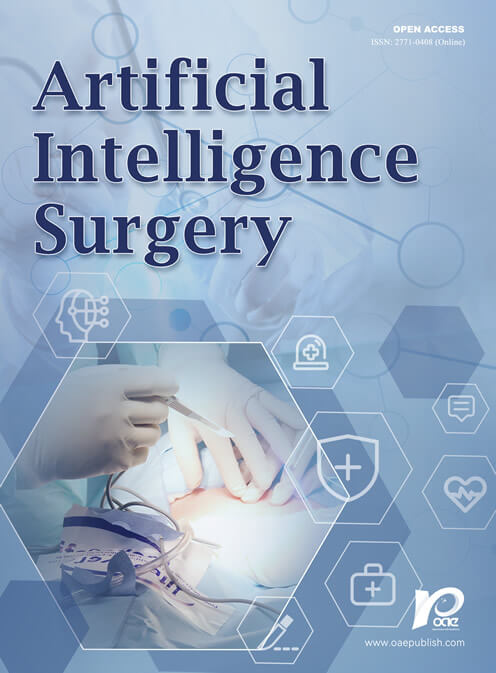REFERENCES
1. Hashimoto DA, Rosman G, Rus D, Meireles OR. Artificial intelligence in surgery: promises and perils. Ann Surg 2018;268:70-6.
2. Maier-Hein L, Eisenmann M, Sarikaya D, et al. Surgical data science - from concepts toward clinical translation. Med Image Anal 2022;76:102306.
3. Hashimoto DA, Witkowski E, Gao L, Meireles O, Rosman G. Artificial intelligence in anesthesiology: current techniques, clinical applications, and limitations. Anesthesiology 2020;132:379-94.
4. Hashimoto DA, Ward TM, Meireles OR. The role of artificial intelligence in surgery. Adv Surg 2020;54:89-101.
5. Alapatt D, Mascagni P, Vardazaryan A, et al. Temporally constrained neural networks (TCNN): a framework for semi-supervised video semantic segmentation. Comput Vis Pattern Recognit 2021; doi: 10.48550/arXiv.2112.13815.
6. Bektaş M, Zonderhuis BM, Marquering HA, Costa Pereira J, Burchell GL, van der Peet DL. Artificial intelligence in hepatFIGopancreaticobiliary surgery: a systematic review. Art Int Surg 2022;2:132-43.
7. Stam WT, Goedknegt LK, Ingwersen EW, Schoonmade LJ, Bruns ERJ, Daams F. The prediction of surgical complications using artificial intelligence in patients undergoing major abdominal surgery: a systematic review. Surgery 2022;171:1014-21.
8. Merath K, Hyer JM, Mehta R, et al. Use of machine learning for prediction of patient risk of postoperative complications after liver, pancreatic, and colorectal surgery. J Gastrointest Surg 2020; 24:1843-51.
9. Borakati A, Banu Z, Raptis D, et al. New onset diabetes after partial pancreatectomy: development of a novel predictive model using machine learning. HPB 2021;23:S814.
10. Al-Haddad MA, Friedlin J, Kesterson J, et al. Natural language processing for the development of a clinical registry: a validation study in intraductal papillary mucinous neoplasms. HPB 2010;12:688-95.
11. Roch AM, Mehrabi S, Krishnan A, et al. Automated pancreatic cyst screening using natural language processing: a new tool in the early detection of pancreatic cancer. HPB (Oxford) 2015;17:447-53.
12. Tunstall L, von Werra L, Wolf T. Natural language processing with transformers. Available from: https://www.amazon.com/Natural-Language-Processing-Transformers-Revised/dp/1098136799 [Last accessed on 29 Dec 2022].
13. Payne TH, Alonso WD, Markiel JA, et al. Using voice to create inpatient progress notes: effects on note timeliness, quality, and physician satisfaction. JAMIA Open 2018;1:218-26.
15. Kenngott HG, Wagner M, Gondan M, et al. Real-time image guidance in laparoscopic liver surgery: first clinical experience with a guidance system based on intraoperative CT imaging. Surg Endosc 2014;28:933-40.
16. Haouchine N, Cotin S, Peterlik I, et al. Impact of soft tissue heterogeneity on augmented reality for liver surgery. IEEE Trans Vis Comput Graph 2015;21:584-97.
17. Giannone F, Felli E, Cherkaoui Z, Mascagni P, Pessaux P. Augmented reality and image-guided robotic liver surgery. Cancers 2021:13.
18. Mascagni P, Alapatt D, Urade T, et al. A computer vision platform to automatically locate critical events in surgical videos: documenting safety in laparoscopic cholecystectomy. Ann Surg 2021;274:e93-5.
19. Mascagni P, Vardazaryan A, Alapatt D, et al. Artificial intelligence for surgical safety: automatic assessment of the critical view of safety in laparoscopic cholecystectomy using deep learning. Ann Surg 2022; 275:955-961.
20. Madani A, Namazi B, Altieri MS, et al. Artificial intelligence for intraoperative guidance: using semantic segmentation to identify surgical anatomy during laparoscopic cholecystectomy. Ann Surg 2022;276:363-9.
21. Ward TM, Hashimoto DA, Ban Y, Rosman G, Meireles OR. Artificial intelligence prediction of cholecystectomy operative course from automated identification of gallbladder inflammation. Surg Endosc 2022;36:6832-40.
22. Meireles OR, Rosman G, Altieri MS, et al. SAGES Video Annotation for AI Working Groups. SAGES consensus recommendations on an annotation framework for surgical video. Surg Endosc 2021;35:4918-29.
23. Ward TM, Fer DM, Ban Y, Rosman G, Meireles OR, Hashimoto DA. Challenges in surgical video annotation. Comput Assist Surg (Abingdon) 2021;26:58-68.
26. Gordon L, Grantcharov T, Rudzicz F. Explainable artificial intelligence for safe intraoperative decision support. JAMA Surg 2019;154:1064-5.
27. Ghassemi M, Oakden-rayner L, Beam AL. The false hope of current approaches to explainable artificial intelligence in health care. Lancet Digital Health 2021;3:e745-50.
28. Mazer L, Varban O, Montgomery JR, Awad MM, Schulman A. Video is better: why aren’t we using it? Surg Endosc 2022;36:1090-7.
29. Gibaud B, Forestier G, Feldmann C, et al. Toward a standard ontology of surgical process models. Int J Comput Assist Radiol Surg 2018;13:1397-408.









